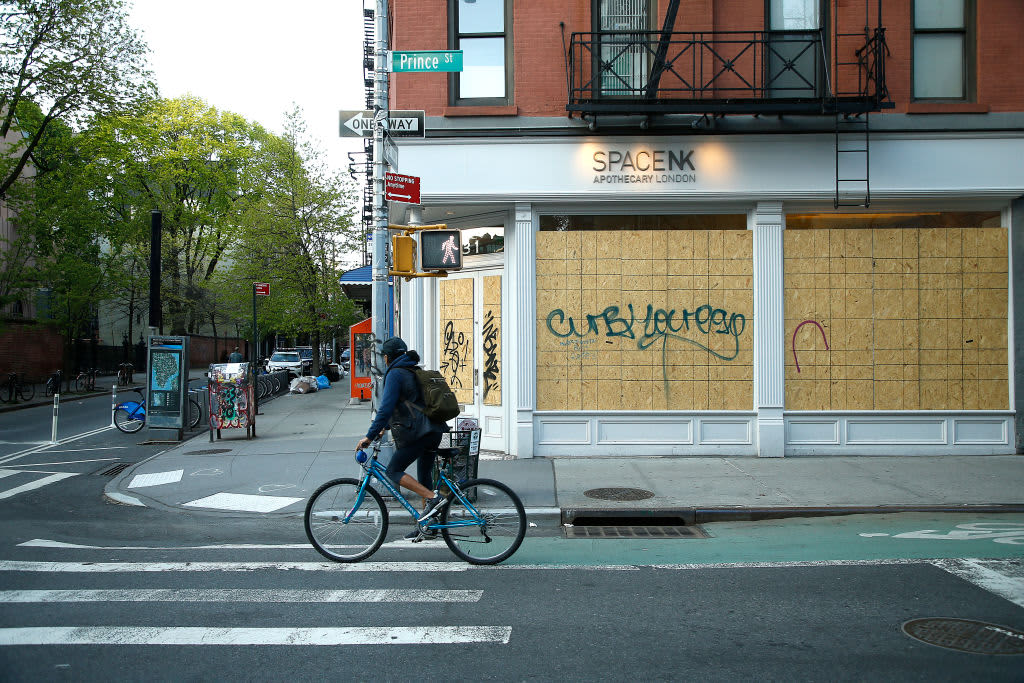A cyclist passes a boarded up store during the coronavirus pandemic on April 28, 2020 in New York City.
John Lamparski | Getty Images
April’s 12% rally in the S&P 500 has been based largely on hopes for a reopening of the U.S. economy, but if you want to know how fragile the reopening may be, try talking to veteran restaurant owner Peter Dissin.
Dissin is the owner of Pinefish, a well-regarded restaurant in Center City Philadelphia, which is currently closed. Dissin has applied for a federal loan through the Paycheck Protection Program to keep him afloat, but he is still waiting to hear back. He continues to do a takeout business, which brings in 25% of his former revenue. He is down to two other employees.
Dissin is not sure when he will be allowed to reopen, but just figuring out the economics of opening a restaurant under new social distancing rules is daunting.
He figures his 60-seat restaurant will only be able to handle 30 — half his capacity — under new social distancing rules. Would that work?
“It would only work if I changed the menu, cut my staff, and dramatically cut my rent,” he said.
He is planning to go to his landlord to ask that the rent be changed to a percentage of his revenue, rather than a flat rent as it is now. “If that doesn’t happen, I’m out of business, even if we reopen.”
Another complication is what to do with the dishes. “The most dangerous job is going to be the dishwasher job,” he said. He is considering switching the entire restaurant to paper plates and plastic utensils to cut down on the risk.
All of this — the staff cuts, the rent cuts, the menu changes, the paper plates — is predicated on the notion that he can even get half his customers back.
Dissin isn’t so sure.
“It doesn’t matter if the state tells me I can reopen. People will go out when they feel safe and secure,” he said, adding that the comfort level for people will vary widely. “I have older friends who tell me they are not going to go out until there is a vaccine.”
Reopening must go well
All of this confusion among the millions of small business owners in the United States — the heart of the U.S. economy —leaves the market vulnerable to a downturn if expectations for a slowdown get worse.
“In our opinion, the next month is a wild card and critical for the future direction of [second half] earnings expectations,” Nick Raich, who covers corporate earnings at the Earnings Scout, wrote in a note to clients. “If business re-openings go well, as we anticipate, the drop in EPS estimate cuts will most certainly abate. If not, the worst of the cuts may not be over.”
That makes sense to UBS’ Art Cashin. Cashin has watched in amazement as the markets have rallied on a combination of hopes for a smooth reopening, expanded testing and treatment advances, fiscal and monetary stimulus, and low rates.
But Cashin has been a vocal critic of the idea that the reopenings will go smoothly. “Many of us have been saying that a V-shaped rebound is unlikely,” Cashin said.
He acknowledges that the biggest risk is a wave of reinfections that forces states to close once again, but he insists the bigger surprise is simply that the reopening is a bit of a bust.
“People are not going to be flocking to bars, restaurants, and movie theaters, or getting on airlines, even after the reopening,” Cashin said, even if there is no immediate secondary wave of reinfections. “Fear of contagion is going to keep a lot of people home for a while.”
Cashin believes the positive developments are now giving way to May, traditionally a time when earlier market rallies slow down or falter.
His point is that the traditional first of May refrain, “sell in May and go away,” may not mean much in this extraordinary situation, but the warning is still very real.
